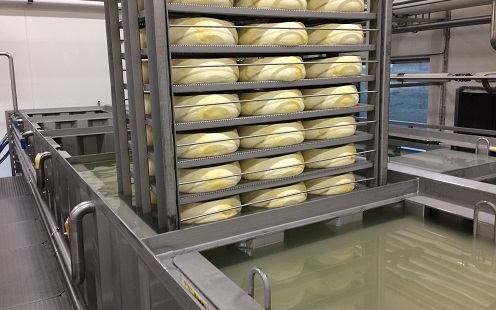InBrine – Identifying and understanding the impact of the cheese brine microflora
Smear formation on the cheese surface is an effective barrier to protect against spoilage moulds. The microflora on the surface of the cheese originate from this smear, but it may also originate from the cheese brine. The main objective of the project is to optimise flavour development and inhibition of spoilage moulds on surface-ripened Danish cheeses by mapping and identifying the entire brine microbiota.

In cheese ripening, establishing a functional microflora on the cheese surface is crucial for flavour development. Furthermore, the smear formation on the cheese surface is an effective barrier to protect against spoilage moulds. For surface ripened cheeses, the microflora comes from the smearing taking place in the dairy, but it may also originate from the cheese brine, a saltwater solution that salts and preserves the fresh cheese.
However, today very little knowledge exists on how the composition of the brine microbiota influences the cheese quality, even though this is a crucial step in the Danish cheese production. Recent studies have indicated that the microbiota on cheese surfaces is partly dominated by a marine microflora that does not derive from the smear culture, and these microorganisms are quite difficult to cultivate in the laboratory.
Even though brining is a traditional step in cheese production, the consequences of common technical brine practices like pasteurisation of the brine, increasing its pH value and changing its chemical composition, are not fully understood yet. Large differences exist in how Danish dairies treat their cheese brine, and it is possible that the different treatments have impacts on the cheese quality.
The main objective of the project is to map and identify the entire brine microbiota in order to optimise flavour development and inhibition of spoilage moulds on surface-ripened Danish cheeses. Understanding the impact of the brine microbiota on cheese making could open new gates for future dairy research, and possibly point out new directions for optimisation of cheese production in the Danish dairy industry. This hopefully could lead to increased product output and reduced waste.
Lene Jespersen
Professor
Microbiology and Fermentation
Nils Arneborg
Asociate professor
Microbiology and Fermentation
Mikael Agerlin Petersen
Associate professor
Design and Consumer Behavior
- The Danish Dairy Research Foundation, Denmark
- Thise Mejeri A.m.b.a., Denmark
- Nørup Mejeri, Denmark
Funded by:

Project: InBrine – Identifying and understanding the impact of the cheese brine microflora
Period: 1st of November 2017 - 2022
Grant donor: Danish Dairy Research Foundation
FOOD grant: DKK 3,602,846
Total grant: DKK 3,602,846
Total budget: DKK 4,012,476

